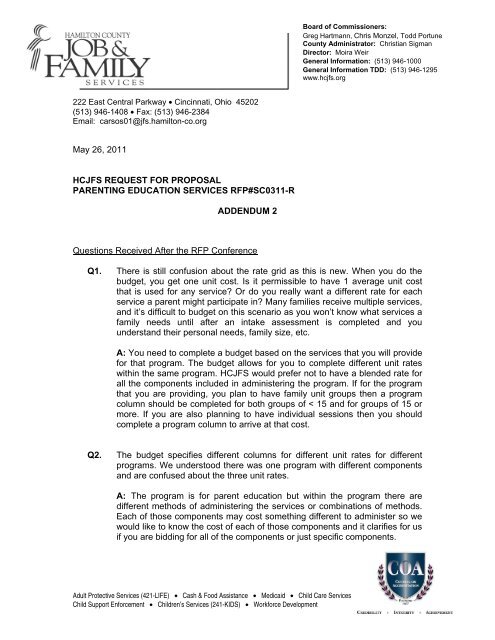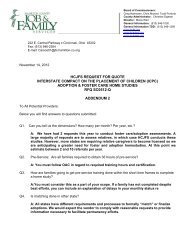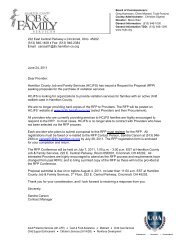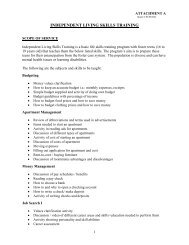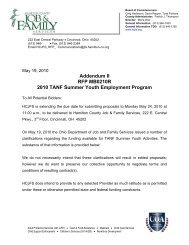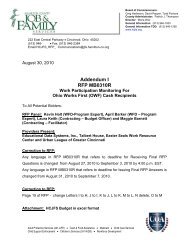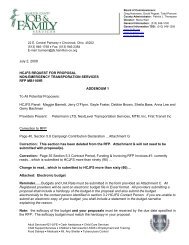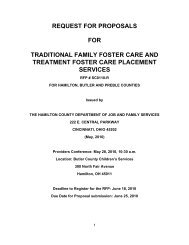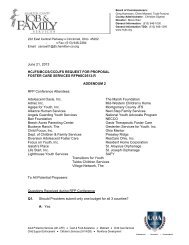Parenting Education Addendum II - Hamilton County Job & Family ...
Parenting Education Addendum II - Hamilton County Job & Family ...
Parenting Education Addendum II - Hamilton County Job & Family ...
Create successful ePaper yourself
Turn your PDF publications into a flip-book with our unique Google optimized e-Paper software.
Board of Commissioners:<br />
Greg Hartmann, Chris Monzel, Todd Portune<br />
<strong>County</strong> Administrator: Christian Sigman<br />
Director: Moira Weir<br />
General Information: (513) 946-1000<br />
General Information TDD: (513) 946-1295<br />
www.hcjfs.org<br />
222 East Central Parkway • Cincinnati, Ohio 45202<br />
(513) 946-1408 • Fax: (513) 946-2384<br />
Email: carsos01@jfs.hamilton-co.org<br />
May 26, 2011<br />
HCJFS REQUEST FOR PROPOSAL<br />
PARENTING EDUCATION SERVICES RFP#SC0311-R<br />
ADDENDUM 2<br />
Questions Received After the RFP Conference<br />
Q1. There is still confusion about the rate grid as this is new. When you do the<br />
budget, you get one unit cost. Is it permissible to have 1 average unit cost<br />
that is used for any service? Or do you really want a different rate for each<br />
service a parent might participate in? Many families receive multiple services,<br />
and it’s difficult to budget on this scenario as you won’t know what services a<br />
family needs until after an intake assessment is completed and you<br />
understand their personal needs, family size, etc.<br />
A: You need to complete a budget based on the services that you will provide<br />
for that program. The budget allows for you to complete different unit rates<br />
within the same program. HCJFS would prefer not to have a blended rate for<br />
all the components included in administering the program. If for the program<br />
that you are providing, you plan to have family unit groups then a program<br />
column should be completed for both groups of < 15 and for groups of 15 or<br />
more. If you are also planning to have individual sessions then you should<br />
complete a program column to arrive at that cost.<br />
Q2. The budget specifies different columns for different unit rates for different<br />
programs. We understood there was one program with different components<br />
and are confused about the three unit rates.<br />
A: The program is for parent education but within the program there are<br />
different methods of administering the services or combinations of methods.<br />
Each of those components may cost something different to administer so we<br />
would like to know the cost of each of those components and it clarifies for us<br />
if you are bidding for all of the components or just specific components.<br />
Adult Protective Services (421-LIFE) • Cash & Food Assistance • Medicaid • Child Care Services<br />
Child Support Enforcement • Children’s Services (241-KIDS) • Workforce Development
Q3. With regard to court testimony, is it correct to assume that testimony is<br />
limited to treatment plan and progress, and there will be no expectation for<br />
custody recommendations?<br />
A: Court testimony may include your assessment and judgment related to<br />
parental capacity and ability to safely and adequately meet a child’s care<br />
needs. Your testimony and ongoing recommendations are highly considered<br />
when making permanency decisions for children.<br />
Q4. Is it reasonable to assume that payment for court testimony is built into the<br />
budget?<br />
A: Yes, when court testimony is requested by HCJFS. HCJFS will not<br />
reimburse court testimony on behalf of a parent or other third party subpoena.<br />
It is reasonable for your agency to assess fees directly to those parties in the<br />
event of a subpoena.<br />
Q5. What are the requirements for Medicaid transportation and can that be used<br />
for the participants?<br />
A: Non-emergency transportation is to be used for Medicaid eligible<br />
customers to Medicaid billable services, therefore, non-emergency<br />
transportation services may not be used for parenting services.<br />
Q6. We anticipate some participants will require substance abuse services. Is<br />
JFS interested in drug screening as part of the proposal?<br />
A: Not at this time. We currently access substance abuse treatment services<br />
through our MOU with the Mental Health Recovery & Services Board<br />
(MHRSB), who is in contract with FAIR (<strong>Family</strong> Access to Integrated<br />
Recovery).<br />
Q7. If assessment reveals a mental health disorder, is there a special process for<br />
referral for mental health treatment for the participants in the program?<br />
A: Any assessments conducted should be focused on overall parenting<br />
capacity. If mental health concerns are noted through your assessment and<br />
evaluation, those should be communicated with the caseworker, who can<br />
refer the consumer to appropriate services.<br />
Adult Protective Services (421-LIFE) • Cash & Food Assistance • Medicaid • Child Care Services<br />
Child Support Enforcement • Children’s Services (241-KIDS) • Workforce Development
Q8. Due to the large number of staff at our agency, we were wondering if we<br />
could list salary amounts for direct/indirect service programs not included in<br />
this project by one total. Please reference Attachment C, page 4 (instructions<br />
for budget section A – page 2; staff positions).<br />
A: Yes, all other positions not directly or indirectly associated with the<br />
service being proposed may be grouped together and listed as “All Other<br />
Positions” with their total salaries listed under the column “Other Direct Ser”.<br />
However, all management and administrative positions indirectly associated<br />
with the service being proposed should be listed with their corresponding<br />
salaries listed under the column, “Mgmt Indirect”.<br />
Q9. We were wondering if the following are allowable costs – food, client<br />
incentives, transportation and child care?<br />
A: The food must be for clients. Client incentives are permissible.<br />
Transportation for clients and staff is permissible. The mileage<br />
reimbursement rate must not exceed the IRS reimbursement rate. Childcare<br />
is allowable as part of the program costs for when clients bring the child to<br />
the training. However, reimbursing a client for child care in their home is not<br />
allowed.<br />
Q10. If awarded the contract, will we be required to document into the MCP<br />
system?<br />
A: Yes.<br />
Q11. Can you provide trending data on the population served including zip codes,<br />
age of children and other general demographic information for your clients?<br />
A: Unfortunately, we can only provide the numbers that were included in our<br />
bid at this time.<br />
Q12. Are there any exclusionary criteria?<br />
A: No.<br />
Q13. Are any of these families engaged in the Intensive <strong>Family</strong> Intervention<br />
Service or Intensive <strong>Family</strong> Restoration Service programs as well? If so, will<br />
they also be eligible for Parent <strong>Education</strong> Services?<br />
A: We would assess this on a case-by-case basis, but it is possible.<br />
Adult Protective Services (421-LIFE) • Cash & Food Assistance • Medicaid • Child Care Services<br />
Child Support Enforcement • Children’s Services (241-KIDS) • Workforce Development
Q14. When do you anticipate that you will be notifying the agency(s) you have<br />
selected?<br />
A: Proposal review is anticipated to be completed on June 27, 2011.<br />
Providers will be notified, in writing, after that date.<br />
Adult Protective Services (421-LIFE) • Cash & Food Assistance • Medicaid • Child Care Services<br />
Child Support Enforcement • Children’s Services (241-KIDS) • Workforce Development


